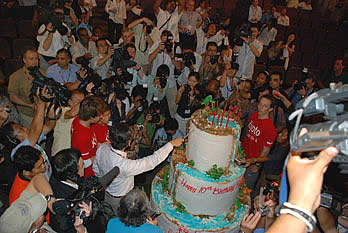Delegates at UN climate talks resisted US pressure to delete tough 2020 guidelines for cutting greenhouse gases with the European Commission saying they were a "crucial" element in a draft text.
The UN-led talks have become dominated by disputes over whether a text should keep a mention of a need for rich nations to axe greenhouse gas emissions by 25 to 40 percent below 1990 levels by 2020 to avoid the worst impacts.
Japanese Environment Minister Ichiro Kamoshita cuts a giant cake representing 10 years of the Kyoto Protocol during the UN Climate Conference in Nusa Dua, Bali, Indonesia, yesterday.
Any watering down or removal of the non-binding range would anger developing nations, which are demanding rich nations do more to cut their own greenhouse gas emissions.
Washington and Tokyo want the range cut out but it was still in the latest draft on Tuesday, delegates said.
"Of course it is crucial for the European Union, and not only for the European Union," EU Environment Commissioner Stavros Dimas said of the indicative 25 to 40 percent range.
"In order to gather an effective fight against climate change we need this range of reductions for developed countries by 2020," he told a news conference at the 190-nation meeting.
The December 3-14 talks are seeking to agree guidelines to launch formal negotiations on a new deal for all nations to curb greenhouse gases beyond 2012, widening the current Kyoto Protocol which only sets targets for 36 industrialised nations.
Washington says a mention of 2020 cuts would prejudge the outcome of negotiations on a new pact meant to widen action against climate changes such as droughts, rising seas or a melting of Himalayan glaciers.
The row overshadowed yesterday's 10th anniversary celebrations of the Kyoto Protocol, the current UN plan for combating global warming. Delegates ate a 1.8 m high cake and sang "Happy Birthday".
"Good progress has been made but it's not a done deal yet," the head of the UN's Climate Change Secretariat, Yvo de Boer, told a separate meeting of finance ministers. "It's probably going to take a couple of sleepless nights to bring all countries, rich and poor, on board."
Australia's new centre-left Prime Minister Kevin Rudd arrived in Bali and plans to hand over documents ratifying the Kyoto Protocol to UN Secretary-General Ban Ki-moon today, when more than 100 environment ministers will attend.
Australia's ratification leaves the United States as the only rich nation outside Kyoto. President George W. Bush argues that it would cost jobs and wrongly excludes poor nations.
Finance ministers meeting on the fringes of the meeting agreed to further debate but little else after two days trying to find ways to fund the fight against global warming.
Indonesia's President Susilo Bambang Yudhoyono urged the ministers to do more. "Ministers of finance can and should play a much larger and more active role in responding to climate change, both domestically and internationally," he said.
The United Nations wants all countries to aim for a 2009 deadline to decide on a successor to Kyoto, building on global momentum after reports by the UN panel this year squarely blaming mankind for warming, mainly by burning fossil fuels.
(China Daily December 12, 2007)






